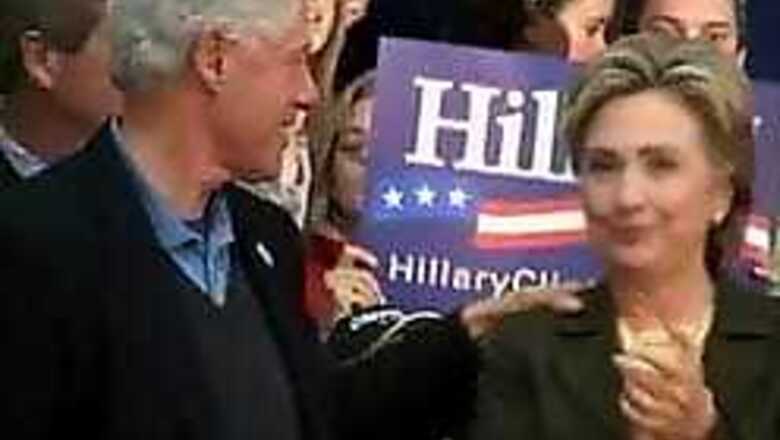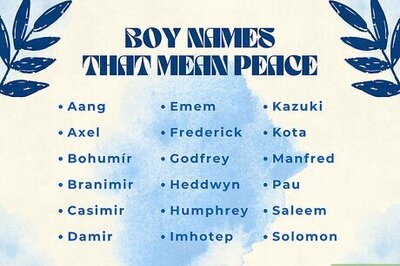
views
The News Junkie Podcast with H R Venkatesh. This week, Venkatesh talks to CNN-IBN Foreign Editor Surya Gangadharan on the US Presidential elections, how the process of voting is different from Parliamentary elections in India, and tries to make sense of terms such as ‘Caucuses’, and ‘Primaries’.
H R Venkatesh: Hello and welcome to The News Junkie Podcast. This week, we’re discussing the US Presidential elections, which are well under way now, Hillary Clinton having won the New Hampshire Primary. But there are so many ways in which the US elections differ from ones in India, for that matter in other democracies around the world and to talk a little about that I have with me Surya Gangadharan, Foreign Editor of CNN-IBN. Surya thanks for joining us.
Surya Gangadharan: Glad to, this is interesting the US elections has a very close bearing on India’s foreign policy, so we’re looking very, very carefully.
H R Venkatesh: Very, very closely I gather not just because the US is the oldest democracy and India is the largest democracy?
Surya Gangadharan: Also the personalities you know, Hillary Clinton the first woman to become President, if she wins them and Barack Obama, the first African American to have gone so far and seen such high ratings. These are very, very interesting people for us here and of course, the role of Indian Americans.
H R Venkatesh: All right, over the next few minutes I’ll ask you questions on the fundamental differences in the way India elects its leaders and the way it is done in the US. I understand, what’s happening right now is that there are these Caucuses, which Barack Obama won in Iowa for the Democrats, and these Primaries which Hillary Clinton won in New Hampshire and of course, John McCain for the Republicans. What essentially is a Caucus and what is a Primary?
Surya Gangadharan: I think the first thing we need to get right is that the current system in the US refers to way in which America grew up, you know, small, scattered colonies, New York at one end, California at another, 16th, 17th century communication was limited, it used to take a whole year for these guys to get together and that’s what today’s system also reflects.
A Caucus is basically a small group of people getting together, voting for the person they feel should be Presidential candidate. We’ve seen that in Iowa and again in New Hampshire. The really big time is on February 5th, called Super Tuesday where 24 states get together. Some of them will hold Caucuses, some of them Primaries; a Primary is basically a bigger version of a Caucus. A Caucus is for those states, which have smaller populations, for those people who’re either registered as Republicans or Democrats.
That’s basically the system. The point to understand is the election system in the US is indirect. You basically vote for an electoral college in the state and that in turn will vote for a Presidential candidate. In India’s case it is very different, it’s the Westminster Model that’s used by the British. MPs are voted by the public, and one of those MPs who has been elected to Parliament becomes the Prime Minister.
H R Venkatesh: I thought there’s another interesting angle here, when it comes to inner-party democracy. We have situations in India where the Satrap of a party can anoint his son or daughter to carry on the legacy, so to speak. Sonia Gandhi’s son Rahul Gandhi will carry the Congress flag but is that likely to happen in the US system?
Surya Gangadharan: Well, I think in that sense the US system is far more democratic though of course, Hillary Clinton was First Lady at some point, but she’s also a politician in her own right as well - senator in New York - and she has a track record. People are going to vote for her based on that track record as well. You can’t say the same about Rahul Gandhi, he has no political experience at all other than the fact that he is Ms Gandhi’s son. Well, Sonia Gandhi is trying to give him some political experience before he moves in, but its fairly well known he’s going to be move in and move up and that kind of thing, I think it reflects the social dynamics of India and the social dynamics of the US.
H R Venkatesh: Two final questions here. One, it’s a long process isn’t it. What’s happening right now is that the President is not being chosen, it’s the Presidential candidate that’s being chosen.
Surya Gangadharan: In fact, right now this is the process of figuring out who’re the front-runners. In the Democratic camp it’s fairly clear - either Barack Obama or Hillary Clinton. On the Republicans side it’s still not clear - John McCain won New Hampshire, Mike Huckabee won Iowa so both sides you know, Democrats fairly clear, Republicans, it’s going to take some more time.
H R Venkatesh: I understand then that the final elections, the big elections are slated for November. Does that mean then that everybody turns out to vote in November and everybody turns out to vote in these few weeks as well?
Surya Gangadharan: Basically the electoral colleges, you know, get together and you’ll have these big conventions, one hosted by the Democrats for their people, one by the Republicans, both will have their delegates. Both will vote and then you will have the final round of voting which tells you who will be President. Wait until November for that to roll out.
H R Venkatesh: We have an interesting few months waiting for the elections to end. Thanks for very much for joining us.
Surya Gangadharan: Oh, glad to be doing that.
H R Venkatesh: That’s it then for this week at The News Junkie Podcast. Thanks for listening.

















Comments
0 comment